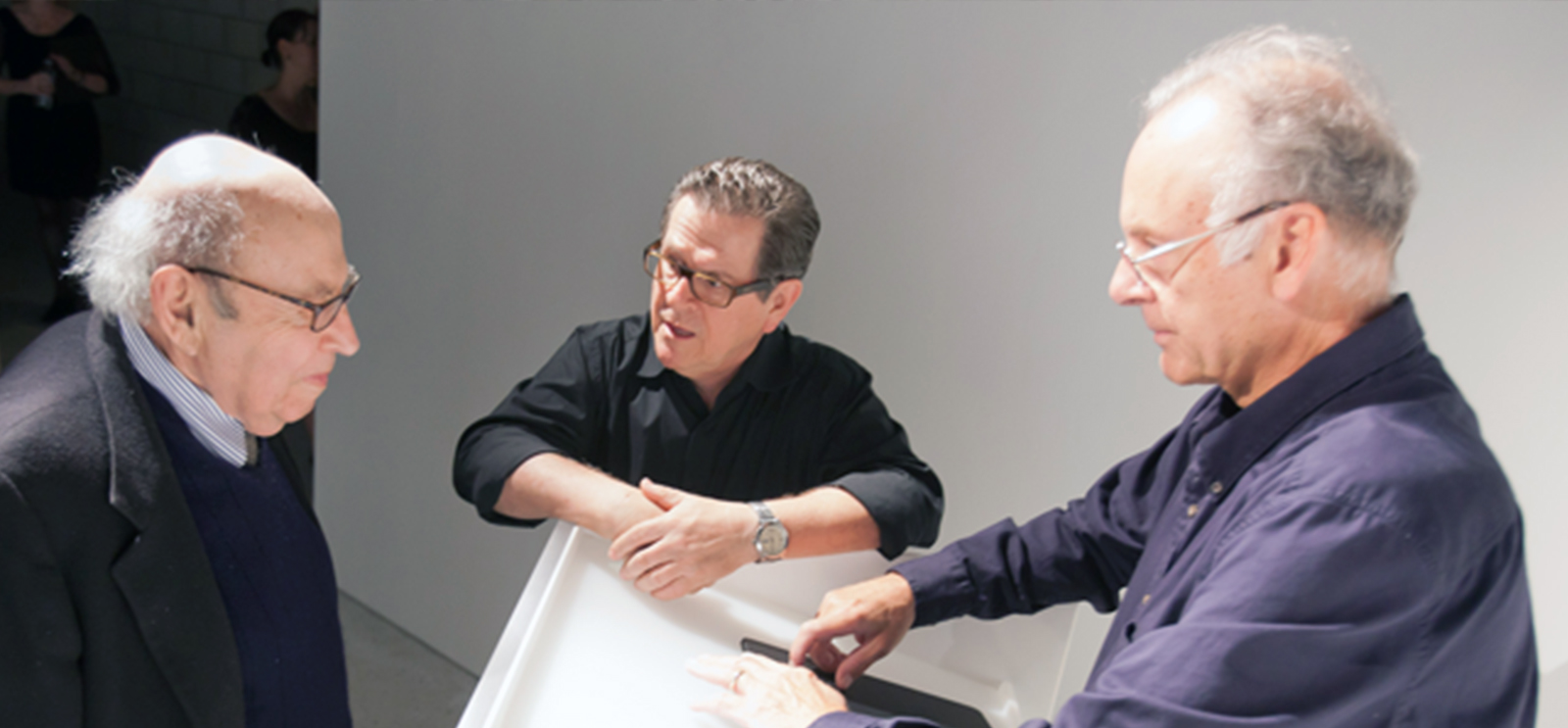
“So, it turns out,” says Bernard Sahlins, AB’43, “that 90 percent of the effect of a play is in the acting and the words. Not the setting, not the staging: the word and the actor.” Sitting in his living room in Chicago’s Old Town neighborhood, three blocks from the famous comedy club he cofounded more than half a century ago, Sahlins is explaining what he’s learned from another, more recent theatrical adventure. For the past several years, Sahlins, who sold the Second City in 1985, has been directing staged readings of verse plays—by Sophocles, Aristophanes, Dylan Thomas, T. S. Eliot—for the Poetry Foundation. In each performance, a handful of actors, seated in a row and wearing simple black, read from scripts perched in front of them.
It’s amazing, Sahlins says, how quickly audiences forget they’re not watching a play, that the actors aren’t “to and fro-ing” in front of them. Even without action, the drama is absorbing. “The sense of involvement is enormous,” he says. “The audience begins to focus on the words and the characters, and are not distracted by costumes and setting. When we did The Waste Land, a lot of the audience brought texts.” As the actors read, they followed along. “That’s an interesting thing to do. It’s like bringing the score to a symphony.”
Which is fitting: poetry is a kind of music, Sahlins says, or it should be. He quotes Irish poet Seamus Heaney, who in his 1995 Nobel lecture (and earlier in a poem called “Song”) described poetry as “the music of what happens.” Sahlins has always read poetry, he says—Heaney is one of his favorites—including verse plays. In the days before Second City, when he did “straight plays,” he directed productions of ancient Greek tragedies. He admires their spareness, how “the poetry is not the aim but the means.”
Sahlins’s first production for the Poetry Foundation, in 2005, was one in the Greek tradition: Eliot’s Murder in the Cathedral, about Archbishop Thomas Becket’s assassination in 1170. Sahlins saw the play in England 20 years ago, and he recalls how his pulse quickened and his eyes went wide. “First of all, it’s beautiful,” he says. So when he and the Poetry Foundation struck up a partnership, Murder in the Cathedral was first on the list. They staged it in five churches around the city, including Rockefeller Chapel, where ten years earlier Sahlins had directed a full production of the play. The readings, he says, were a hit.
Since then he’s directed about two a year, including Archibald MacLeish’s JB, Richard Wilbur’s translation of Moliere’s The Misanthrope, and The Cure at Troy, a play by Heaney based on Sophocles’s Philoctotes. This past February at International House, he directed a reading of Elizabeth Bishop’s poetry and her letters to and from New Yorker editors. The play—“more a documentary than anything else,” Sahlins says—coincided with the release of Elizabeth Bishop and the New Yorker: The Complete Correspondence.
Each production runs for only two nights. Some of Sahlins’s regular actors are Second City alums—among them Bruce Jarchow and Tim Kazurinsky—and Nicholas Rudall, founding director of Court Theatre and professor emeritus of classics at Chicago, with whom Sahlins edits the Plays for Performance book series. Stephen Young, program director for the Poetry Foundation, says the readings invigorate the poetry.“There’s something about hearing them that gives the poems three dimensions. You see and hear things about the language that you don’t appreciate reading quietly to yourself.”
That was certainly true of last December’s Under Milk Wood, Sahlins’s favorite production so far. A Dylan Thomas radio drama, it chronicles a single day in the undulating lives of those who inhabit an imaginary Welsh fishing village called Llareggub (“bugger all” spelled backward). “It is spring,” the play begins, “moonless night in the small town, starless and bible-black, the cobblestreets silent and the hunched, courters’-and-rabbits’ wood limping invisible down to the sloeblack, slow, black, crowblack, fishingboatbobbing sea.”
In mid-September Sahlins and his actors put on an “experiment” called Meet Mr. Yeats. With a script written by Sahlins, it was half poetry, half biography, taking the audience through the towering Irish poet’s life, from his childhood in County Sligo to his death in 1939. “It’s his progress through Irish revolutionary and senator and Nobel laureate and lover,” Sahlins says. “And it’s all reflected in his poetry,” the whimsical lyrics of his youth, the verses about politics and history and family, the lean wisdom of his old age. In 1933’s “Crazy Jane Talks with the Bishop,” one of the last poems quoted in Sahlins’s script, Yeats writes, “For nothing can be sole or whole / That has not been rent.”
The production drew a crowd. Over the two nights, Poetry Foundation staffers turned away almost 100 people at the door. “Not a problem we’re used to in the poetry biz,” Young says. Next, Sahlins might try giving a similar treatment to Elizabeth Bishop and Robert Lowell’s famously intimate yet platonic friendship. “I think their relationship—their nonrelationship, their relating nonrelationship, their nonrelating relationship—would make for a nice evening.”
